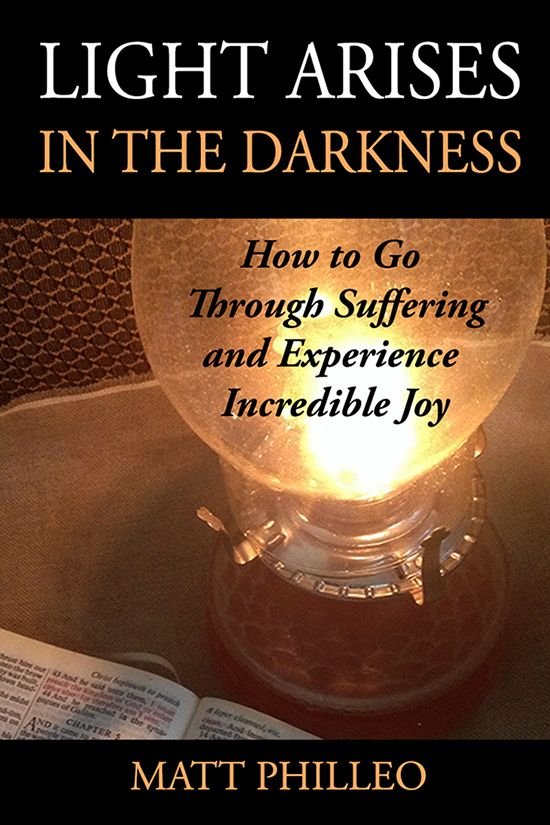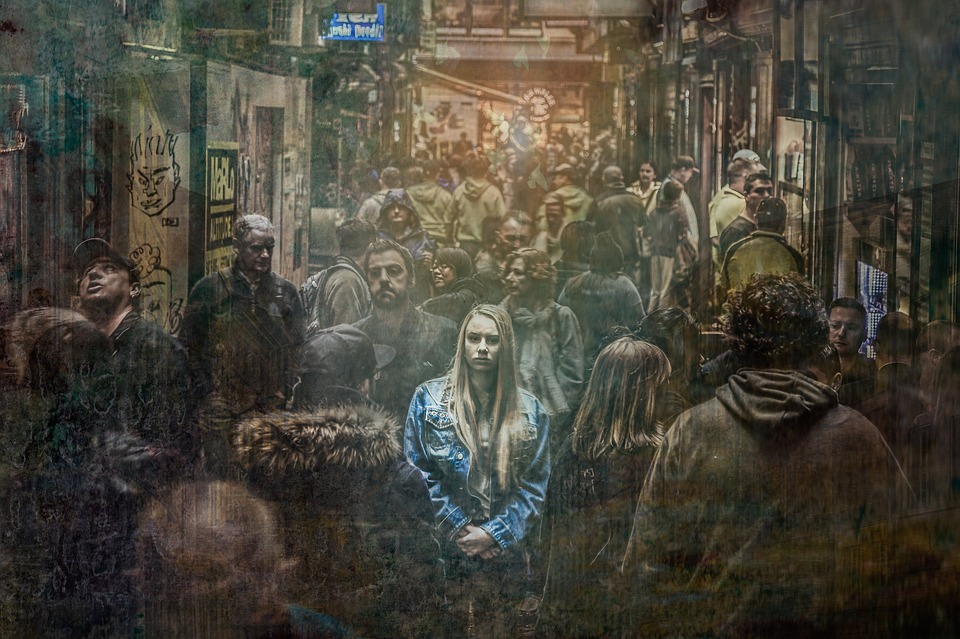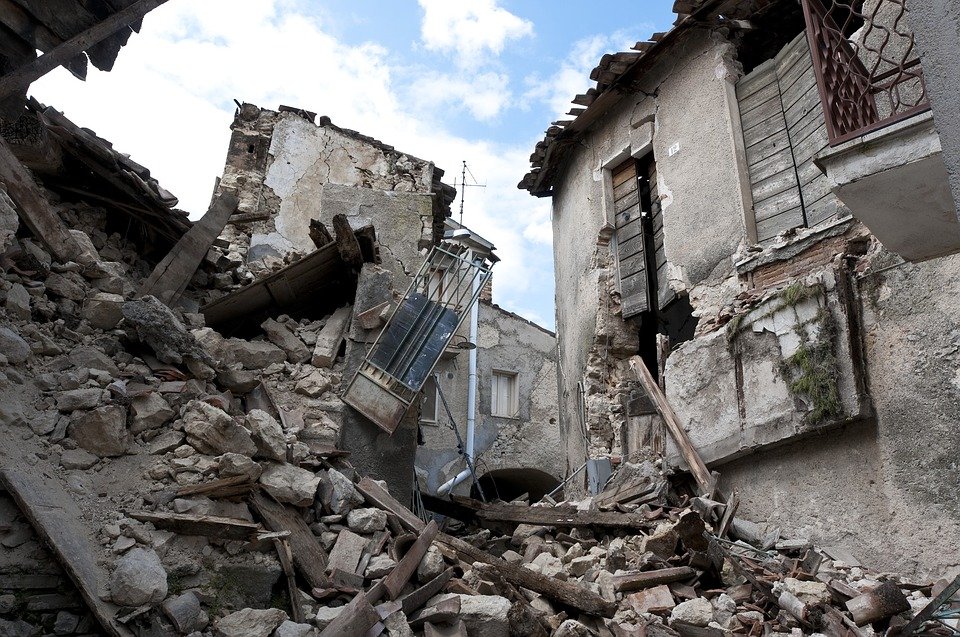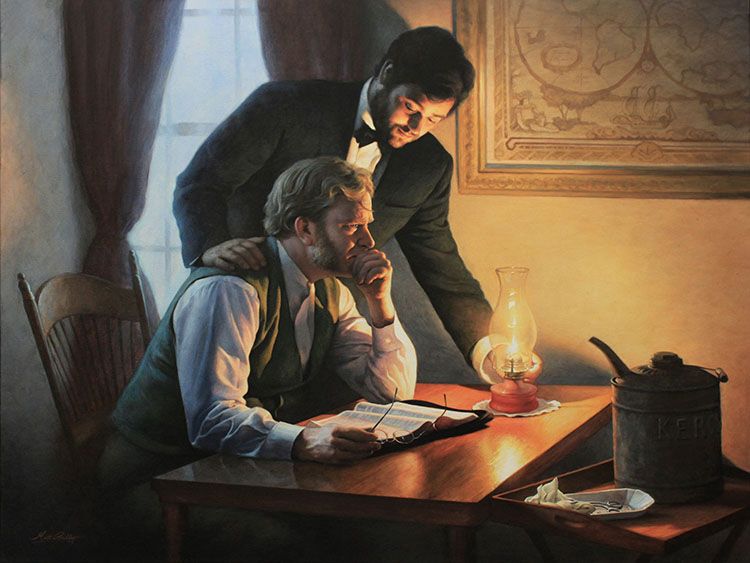Why is there suffering in the world?
In the last post, I shared with you my intro for the book, Light Arises in the Darkness: How to Go Through Suffering and Experience Incredible Joy.
Now, today, I’m going to tackle the question that everyone seems to ask when their world is caving in. Others more scholarly than myself have expounded on the subject far better than I can, but I hope to share a different perspective that may help and encourage you.

Let’s go on to Chapter 1 where we discuss, “Why is there suffering?”
Light Arises in the Darkness
How to Go Through Suffering and Experience Incredible Joy
Copyright 2017 by Matt Philleo. All rights reserved.
———————————————————————————————————————————————————————————————-
I invite you to become a part of my Reader’s Review Group and I’ll let you know whenever I have a new section on the book written. Also, you will receive a discount on the actual book when it’s published. Join today!
(To help you navigate through the book. I’ll be including links below to various posts…)
CONTENTS
- Why is there Suffering
- Acknowledging Your Suffering
- Suffering Caused by Financial Problems
- Suffering Caused by Health Problems
- Suffering Caused by Loss Problems
- Suffering Caused by Relationship Problems
- Suffering Caused by Internal Problems
- Seeking the Lord in Your Suffering
- Responding to His Presence and Encouragement
- Becoming an Encourager

“God is always trying to give good things to us, but our hands are too full to receive them.” ― Augustine of Hippo, City of God
CHAPTER 1: Why is there Suffering?
Suffering is inevitable.
We don’t have to travel long on the journey of life before we encounter pain and suffering. The suffering takes various forms. Sometimes it can be an external struggle, such as a loss of a loved one, a major health issue, a financial setback, or an extremely difficult relationship. It can also be an internal struggle, often triggered by the external struggle.
These internal struggles, manifesting in the form of depression, despair, negative thinking, wrong self-esteem, fear, anxiety, worry, bitterness, temptations, even suicidal tendencies, are often harder to pinpoint, and the struggle is just as real as the external problem. In fact, it’s probably even worse, because the tentacles go far deeper and cause us to walk around with something like sunglasses on all the time, making every fresh moment in life look dark, bleak, and dismal. In turn, this cloudy vision corrupts our judgment to the point that we see things that aren’t there. Instead of opportunities, we see a chance to fail. Instead of people wanting to help us, we suspect they are out to get us. Instead of a God that loves us, we see a God that wants to crush us and ruin our day.
I know. I’ve been there before. Got the T-shirt. And now I’m selling it on e-Bay, because it doesn’t fit who I am!
So, why is there suffering?
That’s a great question. Throughout the centuries, the wisest sages have broken off their collective mind’s teeth, trying to take a bite out of this enigma.

How many times have you heard the question, “If God is good, then why does He allow suffering and pain in the world?” It’s interesting that the question is often posed by atheists or agnostics to discredit the idea of a transcendent supernatural being.
Actually, all they are doing is trying to discredit the idea of a loving transcendent supernatural being. Listen to the core arguments by leading atheistic apologists like Richard Dawkins, Charles Hitchens and Sam Harris and at the root of it, when they have a bone to pick with the Christian worldview, they argue against the existence of God because of all the evil going on in the world. I have listened to many of their debates, and they inexorably keep coming back to that same contention.
They say that the God of the Christian Bible condones, promotes evil and even is evil, and therefore he cannot exist. Not surprisingly, many ardent atheists, often previously religious people, have experienced a traumatic event in their own lives where God appeared to be unavailable or unsympathetic to their plight, and so they concluded there is no God.
And that makes for a compelling point, something they realize innately: If there’s a god, he must and ought to be good. And to some degree, they are right. If god is evil, there cannot be a god.
Now, we don’t invent God. God is not good just because we think He should be or we need a god who is good.
God is good, because that’s just who He is.
I’ll even go so far as to say this: God is good, because if He wasn’t good, He couldn’t be God.
Would it make sense that a tyrannical despot with a personality like Adolf Hitler or Josef Stalin could operate the universe?

Certainly, we did see the rise of Germany and Russia in the 1930’s and 40’s, with socio-economic forces seemingly going their way for a decade or two, but then their prospective empires imploded when the devastation they created backfired. They couldn’t successfully govern their own countries, let alone the laws of physics spanning the galaxies. Think of top executives profiting off of corporate theft and how eventually their mismanagement causes their companies to come crashing down, or at least their own careers. Rulers who are in it for themselves only–which really is the definition of evil–may keep order for a while, but sooner or later, narcissism displaces managerial responsibilities, discontent of the subjugated breeds revolution, and all that the leaders built or inherited has an inevitable collapse.

If there is a god, and he’s evil, even if he could somehow manage to keep the finely-tuned clockwork of the universe ticking, we would not expect to see gorgeous sunsets, flowers adorning the tops of hills, majestic waterfalls, babies smiling and reaching out for their mother’s faces, people in the western world waking up each day to take a cold, clean shower and eat a hot meal whenever they want it.
God is good, because that’s just who He is.
If there is an evil god running the show, we would expect to see the whole world, at every moment and in every place, looking like a garbage dump, with complete mayhem and destruction in every nook and cranny.
But we don’t.
Even more than that, we know that people have the capacity to love, to have compassion, to be generous, to do good things. (At least as far as human goodness goes.) Is it possible that the God who created them and lived for so many years more than them, would not excel in all these qualities? Could the creature be better than the creator?

Recently I created a painting called “Smoldering Wick, a 30” x 40” acrylic on canvas. I consider it my best work to date. It was well received enough that I created reproductions of it. I sold quite a few prints and several of my collectors have remarked on how much they love their copy. But having seen the original up close, the reproductions–as accurate as I tried to make them–don’t even come close to its quality.
So, as an artist, should I expect a reproduction of my artwork to exceed the quality of the original? Of course not! You know too that when you run to the copy shop to print something that there’s always some flaws in the photocopies.
Likewise, should we suppose that as reproductions–in a sense–of God, (the Bible says we are created in His image) we would exceed the deity in all of His good qualities?
Impossible.
And if we can’t exceed Him, then who are we to judge His actions? But people do that every day, and God puts up with it. That is more than we would do, if we looked down every day upon a bunch of tiny ant-like creatures on the one hand thanklessly ignoring us, even as we bent down to feed them, and on the other hand, shaking their fists at us when we turned away for a moment!
God, who is the very essence and definition of good, created this world, and it was good. The suffering came as a result of sin. The disobedience of one person, Adam, brought sin and suffering into the world. This is the world we inherited. The true root of suffering is in the heart of humankind. Lying, stealing, gossiping, racism, warmongering–all those things have come as a result of our rebellion against God. In addition, the Bible says the land has become defiled by our sin, too. That could be the reason for natural disasters like tornadoes, hurricanes, floods, and volcanoes.
You can see that the precision of the finely-tuned universe, and especially our Earth, demands a creator, just as a intricately designed device like an iPad demands a designer. The Bible says, “the heavens declare the glory of God.”

When you see the magnitude of the nighttime sky, you know there’s a God out there. We can calculate when the sun will rise to the second three years from now. That is how well ordered our solar system is. God created it, and God sustains it. And again, we know He can only run the universe properly if He is good.
A friend of mine and I were talking with a man one evening at the University of Eau Claire, Wisconsin and shared the good news of God’s salvation with him. I read out of the book of Romans in the Bible in Chapter 3, where it says, “All have sinned and fall short of the glory of God…” He stopped me and asked, “It says all. Doesn’t that mean God sinned too? God created everybody, knowing they were going to sin, so doesn’t that make him responsible for that evil?”
I replied, “Not at all. If one of my children grew up and robbed a bank and killed someone, but I raised them in a right way, teaching them, praying with them, loving them–would that make me personally responsible for the child’s actions?”
“No, but society would see you as partially responsible.”
“True, but that doesn’t mean society was right in their assessment.”
And this is how society, the world at large sees God. They want to blame him for all the trouble they created.
But then, when things are going well, they want to take all the credit, and tell Him to get out of their hair!
The fact is, God created people with a free will, not as robots. They chose to disobey and sin. They are responsible for their actions, not God.
The true root of suffering is in the heart of humankind.
It’s important that we get this fact nailed down right away. Nothing in your world will make sense if you don’t believe in a good God. And again, I will reiterate: it’s not your belief that makes Him good. He is good, regardless. But if you don’t recognize that truth, the deception will forfeit your peace. You’ll be like a rock climber without a rope, frantically grabbing at every twig to keep you falling, when all the time there is a strong hand lovingly extended to pull you up.
Aren’t you glad that the God who created everything, including yourself, is good?
The suffering we endure as human beings is all our fault, collectively. But your suffering isn’t necessarily your fault. You could be suffering because of bad decisions your parents made, your wife or husband made, your boss made, or your senator made. But if it is your fault, that doesn’t mean that there’s no hope for you.

That will finish it up for today. In the next post, we’ll move right into the rest of Chapter 1: Why is There Suffering? and specifically, “What is the purpose of suffering?”
Be blessed and be encouraged,

Share Your Thoughts!

![[Light Arises in the Darkness] Chapter 1: Why is There Suffering?](https://mattphilleo.com/wp-content/uploads/2017/12/war-2545307_960_720.jpg)
That’s a good way of explaining it, Jerry. Hopefully, some joy can come in too and feel like ointment on the area. 🙂
Thanks, Sheila. I’m glad you caught the missing word, “from.” I tend to do that in my writing. I think my thoughts are jumping ahead of my fingers on the keyboard!
What a great piece 😀
“You can see that the precision of the finely-tuned universe, and especially our Earth, demands a creator,”
Yes, exactly! You reminded me of an art-loving friend of mine who once noted,
‘Without a painter, the brush is useless. That is like us. Without our Creator, we are nothing.’
Thank you, Shakira, for the encouraging words. I agree to your comments wholeheartedly. I like the idea of us being a brush in the Master’s hand. 🙂